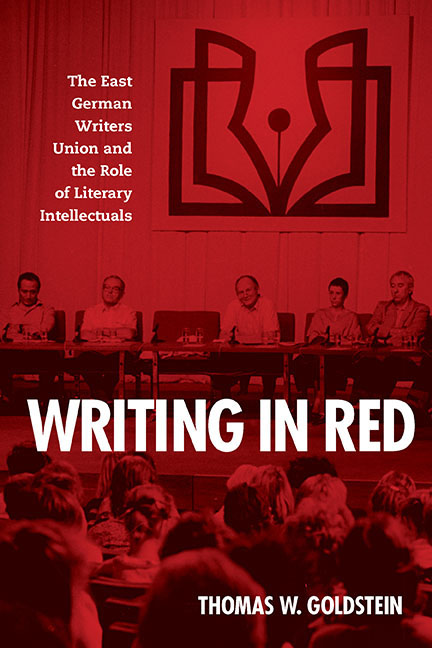Book contents
- Frontmatter
- Contents
- Acknowledgments
- List of Abbreviations
- Introduction
- 1 German Writers Associations through 1970
- 2 Socioeconomic Functions
- 3 The Era of No Taboos? 1971–76
- 4 A Disciplining Instrument, 1976–79
- 5 Defending Peace, Defining Participation, 1979–83
- 6 Years of Resignation, 1983–85
- 7 Glasnost in the GDR? 1985–89
- 8 Coming Full Circle, 1989–90
- Conclusion
- Notes
- Bibliography
- Index
3 - The Era of No Taboos? 1971–76
Published online by Cambridge University Press: 24 August 2019
- Frontmatter
- Contents
- Acknowledgments
- List of Abbreviations
- Introduction
- 1 German Writers Associations through 1970
- 2 Socioeconomic Functions
- 3 The Era of No Taboos? 1971–76
- 4 A Disciplining Instrument, 1976–79
- 5 Defending Peace, Defining Participation, 1979–83
- 6 Years of Resignation, 1983–85
- 7 Glasnost in the GDR? 1985–89
- 8 Coming Full Circle, 1989–90
- Conclusion
- Notes
- Bibliography
- Index
Summary
IN 1971 ERICH HONECKER REPLACED Walter Ulbricht as head of the SED and leader of the GDR, the only major change in East German leadership between 1949 and 1989. Many creative intellectuals hoped the new Party chief would ease restrictions on artistic expression imposed in 1965. The fact that Honecker had masterminded those restrictions was perhaps unknown to them, and his initial steps as leader must have seemed encouraging, for at the 8th Party Congress that June he called for greater diversity in artistic expression to reflect the diversity of life under socialism. More importantly, in a speech at the Central Committee's 4th plenum in December, he declared: “If one proceeds from the firm position of socialism, there can, in my opinion, be no taboos in the field of art and literature.” While likely a cynical gesture that was more about politics than principle, Honecker nonetheless appeared to signal a relaxation of control over artists so long as they remained loyal to socialist principles. Regime officials immediately worried that artists might take liberties with this new course, but authors, like many others in the GDR, understood the speech as a move away from the circumscribed cultural dictates of the 1960s.
All the same, initially there was great confusion as to the precise meaning of “no taboos,” and the shift became the subject of heated debate within the Writers Union. Just weeks after Honecker's speech, in January 1972, the presidium invited high-ranking officials for clarification. Of particular concern was what the new policy meant for authors whom the SED had previously held in contempt. More pointedly, SV leaders complained that the SED was using other literary institutions to reach out to problematic artists in light of the new policy. While supporting reconciliation, Helmut Sakowski was confused as to why the SV was not told about the decision to use the PEN Club for this purpose, suggesting the SED had assigned the two institutions the roles of good cop and bad cop: “one team for criticizing, the Writers Union, the second for caressing, PEN.” Max Walter Schulz agreed, suggesting PEN was being treated as a “medical detachment” with full Party support, even though “he had never before heard of a medical detachment winning a war.” Allegations of favor shown to PEN were nothing new among SV members, but the “no taboos” speech had raised the stakes.
- Type
- Chapter
- Information
- Writing in RedThe East German Writers Union and the Role of Literary Intellectuals, pp. 69 - 96Publisher: Boydell & BrewerPrint publication year: 2017

